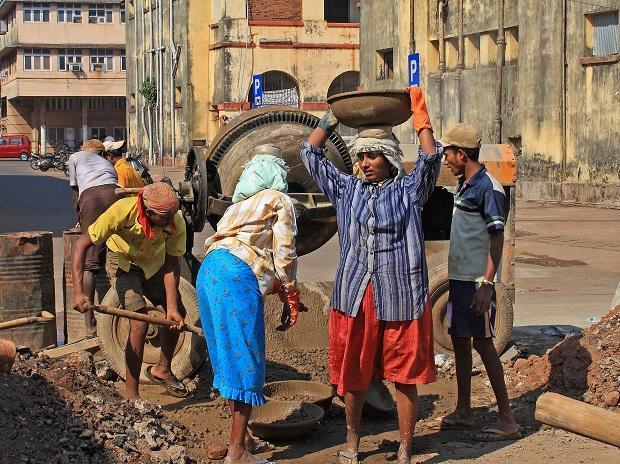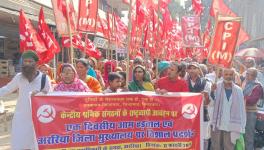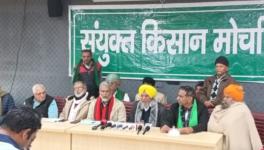3 Years, 3 Proposals, But No Universal Social Security for Indian Workforce

Image Courtesy: Business Standard
In the past days, a news concerning millions of Indian workers, belonging to both organised and unorganised sector, went unnoticed. October 25 was the last day of the pre-legislative consultative process, under which the Ministry of Labour and Employment invited public response on the third preliminary draft of the Code on Social Security 2019. The first one was prepared in 2017 and the second one in the subsequent year.
While both the initial drafts were pulled up for reconsideration after serious discontentment from the stakeholders, reports suggest that even the third draft fails to achieve a common ground. This time, among others, the concerns being raised come straight from the Prime Minister’s Office (PMO) itself. The PMO is unhappy, as the proposal fails to meet the objective of unifying all social security benefits under an umbrella scheme, an Economic Times report quoted a government source as saying. Ironically enough, the idea of unification of social security benefits has already been met with fire, in the past, from the workers’ fronts.
Retaining “Toothless” Provisions of The Existing Laws
Out of the four labour codes proposed, the Code on Social Security is the third one in line – after code on wages and occupational safety, health and working conditions – with an agenda to subsume all the existing 44 labour laws.
When the third proposal was released on September 17, the Bill attracted media glare for it aimed to include the gig economy workers under the ambit of labour laws and thus, tried to score points. However, as noted by numerous workers' organisations, the Bill has excluded the poorest of poor of unorganised sector and those who have been included – such as the gig workers – are assured of nothing.
On October 24, a national level meeting was organised by Working People’s Charter – an alliance of trade union leaders, academicians, lawyers etc. Around 54 trade union and civil society organisations sent a joint response to the draft of the Social Security Bill to the Ministry of Labour and Employment. The response notes that “the Government of India must drop once and for all, fetish of repealing existing laws.”
According to the Working People’s Charter, “The third draft of the code is merely a list of the welfare schemes which the Central and State governments may make available at its executive discretion on some indefinite future dates… what is needed instead is to extend the organised sector benefits like ESI, PF, gratuity, maternity and employees compensation to unorganised sector by including the latter under existing legislations for the same with appropriate amendments.”
Another contentious issue, proposed in the third draft, is of the corporatisation of the Employee Provident Fund Organisation (EPFO) and the Employee State Insurance Corporation (ESIC) – two funds that aim to ensure socio-economic amelioration of the organised workforce – and derecognition of the welfare boards, namely, the Building and Construction Workers welfare boards among others. The Working People’s Charter has called it “a dog in the manger policy.”
Newsclick spoke to Chandan Kumar of Working Peoples Charter, who is also one of the signatories to the response to the labour ministry, according to whom, all that Modi Government has done with the third draft is to the retain the “toothless” provisions of the existing social security laws.
“In the aftermath of the liberalisation policies that were adopted in 1991 by the Indian government, majority of the jobs were created in the informal sector (around 92%, as reported by Indian Spend),” Kumar said, “very similar to the previous governments, the Modi regime has for the third time failed in building a statutory framework for this workforce.”
Giving example of provident funds that invested in IL&FS, which is facing huge financial crisis, the civil society organisations raised their concern with the various workers' funds being eyed for investing in the market. “Given the history of NPAs, and the more recent history afflicting non-banking companies, and the most recent cooperative bank illness, we resist the desire to invest the life savings of poor people in order to promote speculative capital,” it says.
As the concerns regarding the third draft rising from all ends, the the provision for a universal social security for the Indian workforce still remains a pipe dream. The informal workers – constituting almost 93% – feel the heat of it. With no safety, medical facility or any welfare support, the exploitation faced by this group is never ending. The Modi government, on the other hand, seems the least prepared.
Get the latest reports & analysis with people's perspective on Protests, movements & deep analytical videos, discussions of the current affairs in your Telegram app. Subscribe to NewsClick's Telegram channel & get Real-Time updates on stories, as they get published on our website.























